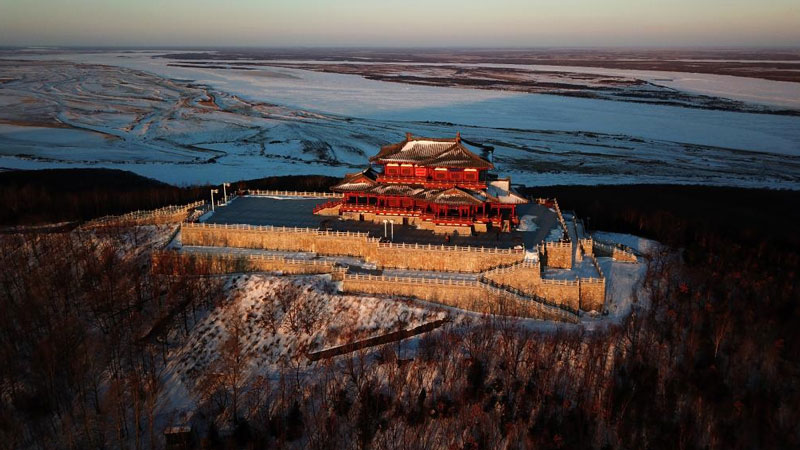China’s economic recovery in focus as WEF kicks off amid fragmentation

People communicate with each other at the Congress Center for the World Economic Forum (WEF) Annual Meeting 2023 in Davos, Switzerland, Jan. 15, 2023. (Xinhua/Lian Yi)
Davos returns to normalcy as world in dire need of solutions
As thousands of political, economic and social leaders from around the world gather in the Swiss resort of Davos for the annual conference of the World Economic Forum (WEF), which kicked off in person on Monday for the first time since the COVID-19 pandemic broke out three years ago, a slew of challenges confronts the global economy, including high inflation, geopolitical tensions, as well as an escalating assault led by the US on the economic globalization agenda that Davos epitomizes.
Amid grim outlooks for the global economy in 2023 and beyond, China's economic recovery that continues to pick up pace following downgraded COVID-19 management and its unwavering determination and increasing efforts to promote economic globalization will be a highlight at the WEF, as the world is in dire need of momentum for both economic growth and globalization, Chinese analysts noted on Monday.
Despite the thorny global challenges that have led to what the WEF describes as a "fragmented world," the closely-watched conference's return to normal form also provides relief that after three years under the cloud of the COVID-19 pandemic, the world is steadily moving out of the haze and at least trying to exchange views and build consensus on tackling those challenges, analysts said.
Normalcy, fragmentation
After a three-year hiatus, more than 2,700 leaders from both the public and private sectors are attending the five-day event in person, according to the WEF. This year's meeting is also being held during its normal January timeframe. All these are unmistakable and encouraging signs that the world, despite lingering curbs, is steadily recovering from the pandemic.
Another encouraging indicator is the large number of world leaders attending this year's annual meeting. More than 50 heads of state or government have announced attendance. Chinese Vice Premier Liu He will attend the annual meeting and is scheduled to deliver a special address on Tuesday morning, according to the WEF.
"This is a platform for building consensus on economic globalization, and under such a complex backdrop, the gathering of world leaders in Davos to discuss and re-understand globalization has a positive meaning," Li Yong, deputy chairman of the Expert Committee of the China Association of International Trade, told the Global Times on Monday.
The WEF also highlighted the complex backdrop, setting the theme for this year's annual meeting as "Cooperation in a Fragmented World." Though the form of the WEF meeting is returning to pre-pandemic normalcy, the state of the global economy, or more precisely, the economic globalization agenda increasingly appears to be at a point of no return due to rising unilateralism and protectionism.
"The annual meeting in Davos will happen against the most complex geopolitics and geoeconomic backdrop in decades," Borge Brende, president of the WEF, said ahead of the meeting. "How can we avoid a global recession, soaring energy, and food prices?"
In its latest Global Economic Prospects Report last week, the World Bank warned that "global growth has slowed to the extent that the global economy is perilously close to falling into recession." The bank further noted that "given fragile economic conditions, any new adverse development - such as higher-than-expected inflation, abrupt rises in interest rates to contain it, a resurgence of the COVID-19 pandemic or escalating geopolitical tensions - could push the global economy into recession."
"The forecast for global growth has been cut again and again, so this is a time for all to seek opportunities for cooperation and help the global economy recover faster," Bai Ming, researcher at the Chinese Academy of International Trade and Economic Cooperation, told the Global Times on Monday.
However, despite the dire need for global cooperation, the US, the world's largest economy, is increasingly turning inward, promoting unilateralism and protectionism and even weaponizing its economic hegemony to crack down on other countries - all directly leading to or exacerbating the current global challenges, analysts noted.
At the WEF's annual meeting, one closely watched topic is the different visions and solutions to global problems presented by the US and China, analysts noted. "China will reiterate support for economic globalization and its continued reform and opening-up policies, whereas the US' main theme is the push for economic decoupling," Li said.
Also underscoring the international community's expectations for interactions between officials of the world's two largest economies, many foreign media outlets are focusing on whether Liu will meet with senior US officials. Amid such attention, China's Commerce Ministry announced on Monday that Liu will meet US Treasury Secretary Janet Yellen in Switzerland on Wednesday to strengthen coordination on macroeconomic and financial policies and implement the important consensus reached by the top leaders of the two countries in Bali, Indonesia.
China in focus
As a major supporter of the WEF and its globalization agenda, China has been a big part of the WEF's annual meetings, with global economic leaders placing high expectations on China's role as the main contributor to global growth. Such expectations will be particularly prominent this year, given the bleak global outlook and the better-than-expected economic recovery in China from recent COVID-19 outbreaks.
"During this forum, the greatest hope of all countries for China is to stabilize the economy, because China's economy has been doing well all along, and it is still very important to the global economy," Lin Boqiang, director of the China Center for Energy Economics Research at Xiamen University and a regular attendee at Davos, told the Global Times on Tuesday.
China faced a huge wave of COVID-19 infection starting in November, but over the past several weeks, economic activities have rebounded rapidly, with many economists and institutions raising China's growth forecast in 2023. Some are expecting China's economy to grow by at least 5 percent this year, even though the global economy is facing a growing risk of falling into recession.
In an interview with Xinhua published on Sunday, Brende, the WEF president, said that China's adjustment to its COVID response "will lead to stronger and more prosperous growth, even if this immediate situation is a bit challenging," which would contribute to global growth.
Bai, who is closely following Davos, also said that "during this forum, countries have two expectations for China's economy. First, that China's economy will be stable. The second is that China's development can release more opportunities, thereby driving other economies."
Photos
Related Stories
- Cooperation rings out in Davos call
- Interview: WEF president optimistic about China's economic outlook
- Chinese premier meets with executive chairman of WEF
- In pics: WEF Annual Meeting 2022 in Davos
- Interview: Countries must pull together to tackle global problems: WEF managing director
- In pics: WEF Annual Meeting 2022 in Davos
Copyright © 2023 People's Daily Online. All Rights Reserved.









